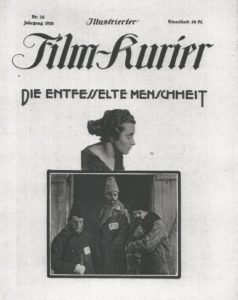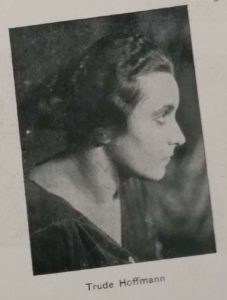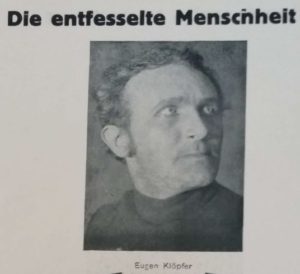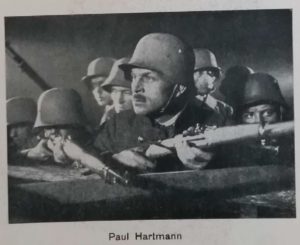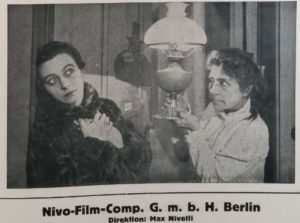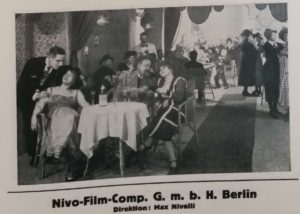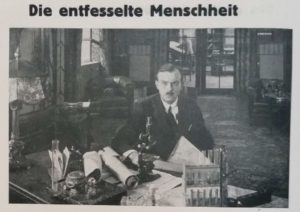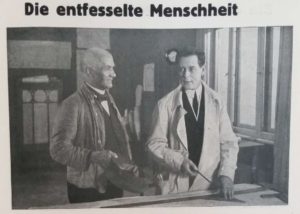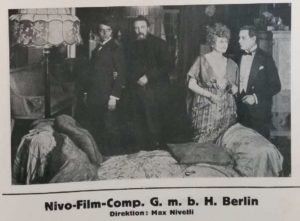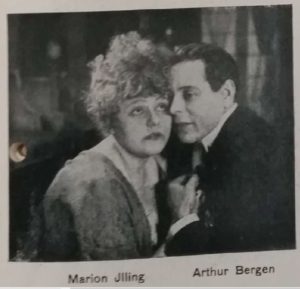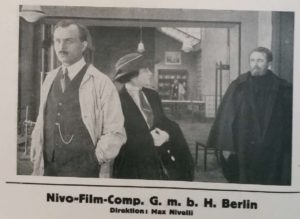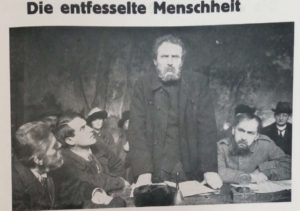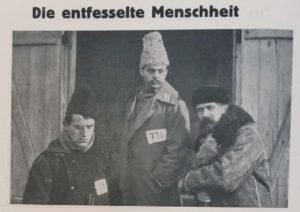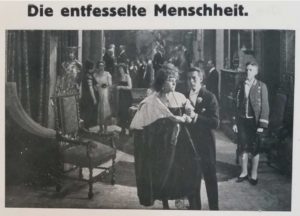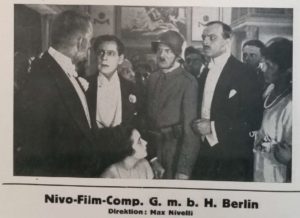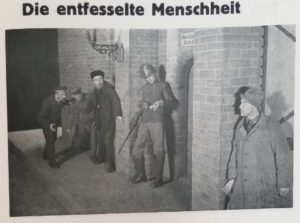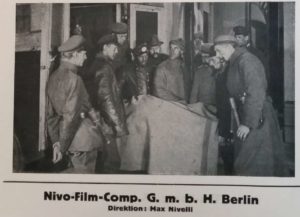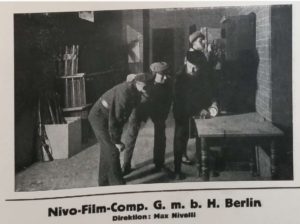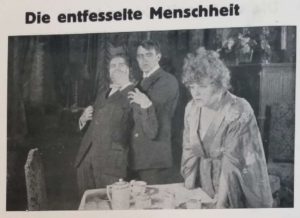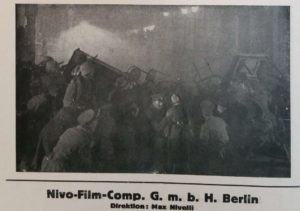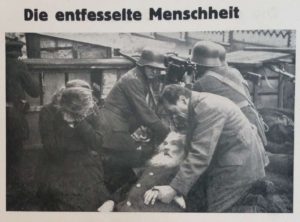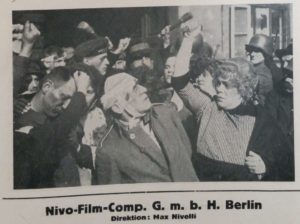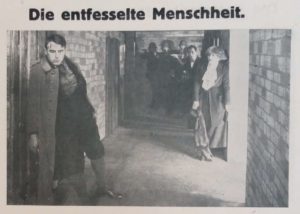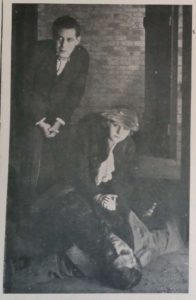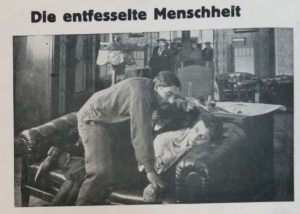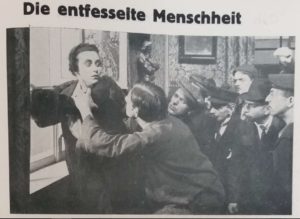Full Storyline
Based on: P. Stiasny, “Humanity Unleashed: Anti-Bolshevism as Popular Culture in Early Weimar Cinema”, in: C. Rogowski (ed.), “The Many Faces of Weimar Cinema”, Rochester NY 2010.
In 1917, towards the end of WWI, two Germans find themselves as prisoners of war in a Russian camp – the engineer Michael Clarenbach and Bernhard Winterstein, a former officer demoted for insubordination. They are both longing to be reunited with their loved-ones, Clarenbach with his faithful wife Rita and Winterstein, with his not-so-faithful mistress Camilla. Winterstein escapes and joins the charismatic Russian agitator Karenow, who preaches for the complete destruction of the social order as a precondition to world 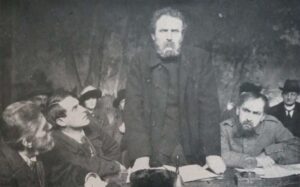 revolution. Following the revolution in Russia, the Bolsheviks release the German prisoners of war. Clarenbach returns to Berlin to reunite with Rita and resume his work as director of a chemical factory. Shortly afterward, the German Republic is declared and the war comes to an end. Clarenbach meets with Winterstein who spreads Karenow’s revolutionary ideas in Berlin. With Winterstein’s help, Karenow has gathered a group of conspirators willing to use violence.
revolution. Following the revolution in Russia, the Bolsheviks release the German prisoners of war. Clarenbach returns to Berlin to reunite with Rita and resume his work as director of a chemical factory. Shortly afterward, the German Republic is declared and the war comes to an end. Clarenbach meets with Winterstein who spreads Karenow’s revolutionary ideas in Berlin. With Winterstein’s help, Karenow has gathered a group of conspirators willing to use violence.
Karenow seeks to win Clarenbach over. He explains: “Poverty is our plow and misery our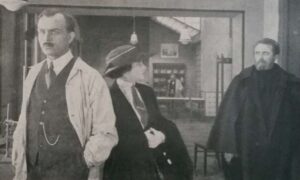 fertilizer. Out of blood and distress, the new will rise! …. the whole fabric of the world has to be destroyed and broken into pieces in order that we shall construct a more beautiful and brighter building upon the rubble”. Unlike Karenow, Clarenbach believes in order and honest labor, which in turn will bring prosperity. He successfully appeals to the striking workers in his factory, to work collectively for a better future. But Karenow, driven by his hatred to Clarenbach, elicits the cooperation of Clarenbach’s wife, who feels neglected by her husband. Rita is drawn to Karenow’s mysterious powers and his revolutionary ideas.
fertilizer. Out of blood and distress, the new will rise! …. the whole fabric of the world has to be destroyed and broken into pieces in order that we shall construct a more beautiful and brighter building upon the rubble”. Unlike Karenow, Clarenbach believes in order and honest labor, which in turn will bring prosperity. He successfully appeals to the striking workers in his factory, to work collectively for a better future. But Karenow, driven by his hatred to Clarenbach, elicits the cooperation of Clarenbach’s wife, who feels neglected by her husband. Rita is drawn to Karenow’s mysterious powers and his revolutionary ideas.
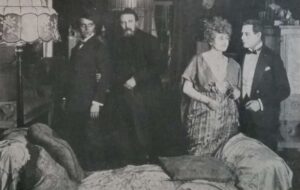 Meanwhile, Winterstein follows Karenow’s orders to use his mistress Camilla into seducing the young and innocent Turenius, whose father owns a large ammunition factory. Through Camilla, the conspirators get hold of the keys to the ammunition depot and blow up the factory. Clarenbach suspects Karenow and goes to his apartment where, to his surprise, he finds his wife instead of Karenow. Rita has warned Karenow and he had left.
Meanwhile, Winterstein follows Karenow’s orders to use his mistress Camilla into seducing the young and innocent Turenius, whose father owns a large ammunition factory. Through Camilla, the conspirators get hold of the keys to the ammunition depot and blow up the factory. Clarenbach suspects Karenow and goes to his apartment where, to his surprise, he finds his wife instead of Karenow. Rita has warned Karenow and he had left.
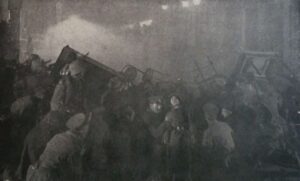 The conspirators further provoke the workers and their sympathizers – they hold mass gatherings and initiate strikes that escalate into an uprising. Joined by criminals and prostitutes, they take up arms, set up street barricades and seize houses. Street fights break out. The rebels resist the intervention of government troops and the newly formed squads which Clarenbach has gathered. Finally, the rebels are defeated, Winterstein dies and the troops are in pursuit of Karenow. As he flees by Clarenbach’s factory, he sees a mob of furious workers threatening Rita. Karenow saves her but he himself is killed. As they look over his dead body, Clarenbach and Rita reconcile as Clarenbach says: “His will was pure, but his way was wrong. When he died, he must have been horrified by the consequences of his own propaganda. The time has come to start working”.
The conspirators further provoke the workers and their sympathizers – they hold mass gatherings and initiate strikes that escalate into an uprising. Joined by criminals and prostitutes, they take up arms, set up street barricades and seize houses. Street fights break out. The rebels resist the intervention of government troops and the newly formed squads which Clarenbach has gathered. Finally, the rebels are defeated, Winterstein dies and the troops are in pursuit of Karenow. As he flees by Clarenbach’s factory, he sees a mob of furious workers threatening Rita. Karenow saves her but he himself is killed. As they look over his dead body, Clarenbach and Rita reconcile as Clarenbach says: “His will was pure, but his way was wrong. When he died, he must have been horrified by the consequences of his own propaganda. The time has come to start working”.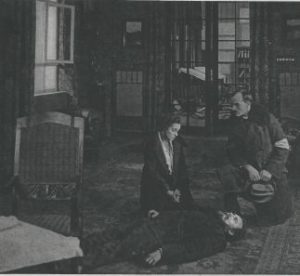
Some Press Reviews
- “The production and direction are excellent and gripping, often amazingly realistic… All roles were played by first-class actors…This film will no doubt create a deep impression wherever it is shown.” Der Kinematograph (724), 1921-01-02
- “The action takes us from the Siberian prisoners of war camp to the Berlin of November 9th, 1918 and depicts the unrest created by the Russian agitators and the class battle that resulted from it. Quality performances were delivered by the leading actors… The Spartacus-like unrest and the street fights are recreated in vivid and true-to-life imagery.” Berliner Morgenpost, 1920-11-21
- “This film is a document of contemporary history and already as such, tremendously valuable… producer Max Nivelli had the courage to create… a grandiose work …through the collaboration with the genius director Joseph Delmont… This film is all German and will precisely for this reason not only cause a sensation abroad but will also be an unbeatable means of propaganda for the large part of the German nation that has higher ideals than wage strikes, revolution, civil war!” Der Film (18), 1920
- “A horrifying image of the revolution… we are dealing here with a very impressive modern film.” Der Tag, 1920-11-20
- “At the time of its premiere, attended by a large number of important personalities including government dignitaries, it was hailed as a great success… Especially the images of the Berlin street fights, which Joseph Delmont tried to represent in such a factual manner, make this film interesting as a historical document.” Berliner Börsen Zeitung, 1920-11-21
- “Glass’ book has little appeal for us nowadays as we have become Germans who are tired of revolutions, just like us being tired of the war in 1918… Joseph Delmont deserves praise as director of this film. The imagery is very effective… (his) choice of a large factory hall with huge generators as background for his collection of revolting laborers, is symbolic. On the whole, the street fights also did not come across as cinema due to their realism.” Berliner Börsenkurier, 1920-11-21
Full Cast
Eugen Klöpfer – Karenow, Russian agitator
Paul Hartmann – Michael Clarenbach, engineer & director of a chemical factory
Carl de Vogt – Bernhard Winterstein, former officer, Karenow’s supporter
Hermann Backmann – Turenius, owner of an ammunitions factory
Arthur Bergen – Franziskus Turenius, his son
Trude Hoffmann – Rita, Clarenbach’s wife
Marion Illing – Camilla, Winterstein’s mistress
Rosa Valetti – Leader of the mob, prostitute
Emil Lindt – Leutenholz, editor of the “Red Torch”
Georg John – Fritz Breese, worker
Emil Linzen – Christoph Jessen
Wolfgang Heinz – Kulicke, worker
Kurt Milkulsky – Lehmann, worker
Alfred Fischer – a foreigner
Leo Koffler – a market seller
Clementine Plehsner – hostess
Maria Forescu – a woman in the mob
Hella Tornegg – a woman in the mob
Lydia Potokaja – a woman in the mob
Sylvia Torf – a woman in the mob
Photo Gallery
(click on any photo to start a slide show)
